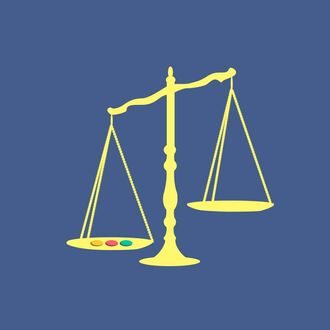
Humans, a million studies and real-world events have shown, care deeply about the distinction between “us” and “them.” We form groups easily, particularly among those who are similar to us, and once we have formed a group, we quickly show a preference toward its members as compared to outsiders. This tendency has helped our species survive and thrive over the millennia, but it also has an obvious dark side: We often don’t treat “outsiders” and “insiders” equally when it comes to fundamental matters of justice and punishment.
Researchers don’t yet have a great grasp on how these tendencies arise in kids, and an interesting new study in Proceedings of the National Academy of Sciences led by Jillian Jordan, a psychology researcher at Yale (she was at Harvard when she conducted the study), sought to investigate this question. Jordan and her team found that — at least in an experimental setting — even from a young age, and even when the groups in question are completely arbitrary ones, humans have a tendency to punish “them” more harshly than “us” for the same infractions.
For the study, Jordan and her colleagues divided a bunch of 6- and 8-year-olds randomly into “blue” and “yellow” groups. Then, they sat individual kids down and explained that another child (not present), sometimes portrayed as a member of the blue group and sometimes as a member of the yellow group, had been given six pieces of candy to allot between herself and a third participant (whose group membership also varied, and who was also absent). Eighty percent of the time, the first child was told the “offerer” had kept all six pieces of candy for herself and given none to the other child — an unfair distribution — while 20 percent of the time, they were told that the child had allocated the candy equitably.
It was the first child’s job to decide whether this was a fair allotment. Before them sat a lever, and if they pushed it one way, they accepted the transaction, and the proper amount of candy would go into the other two children’s bags to be (hypothetically) taken home. But if the first child pushed it the other way, no one would get to take home any candy and — this is key — it would cost the judge herself one piece from her own take-home stash to enact this “punishment” (accepting the deal didn’t cost anything).
Here’s how this looked in action:
“We were just really interested in asking how does this in-group bias develop, and is it the case that as soon as these children begin being willing to pay a cost to intervene against selfish behavior, they’re already biased?” said Jordan. In other words, would the kids be more likely to punish selfish candy allotments when they were the work of an out-group member?
Sure enough, blue-team members were more likely to punish yellow-team kids who distributed the candy unfairly, and vice-versa. This was true in both the 6-year-olds and the 8-year-olds, though the tendency appeared to decline over the two-year span. (The younger group was also more likely to punish when the ripped-off party was a member of their team, but the older one didn’t show any such bias.) It’s an important finding because, to the researchers’ knowledge, it’s the earliest demonstration yet of this sort of bias in punishment.
Zooming out a bit, both this study and a great deal of other work on punishment point to a seemingly strange quirk of how humans deal with cheaters. As Jordan put it, “Why is it that we’d be willing to pay a personal cost [to punish them] even when we haven’t been harmed directly?” Her experiment wasn’t designed to answer this question, but she said there are two schools of thought.
The first is that people engage in this behavior fully altruistically — that is, at no benefit to themselves — because punishing norm-violators is such an important part of maintaining the cohesiveness of social groups. The second is that there is, in fact, a benefit to being the enforcer — that others around you will recognize the valuable role you serve in keeping people in line, and that you garner benefits (social, material, romantic, or whatever) from that role. The two aren’t mutually exclusive — it could be that some instances of norm-enforcement are basically altruistic, while others, perhaps those done with witnesses present, can boost the status of the enforcer.
In any case, this study shows just how intimately tied our biases and senses of justice are from an early age. And it did so using only “minimal” groups that, unlike race or class or religion or any of the other divisions at work in the adult word, were by no means a big or important part of the kids’ identity — rather, they offered what the researchers call in the paper “conservative test” of the effects of groupishness. “I would expect that group membership would always have a bigger effect in real life,” said Jordan. Anyone who has observed how crime and punishment play out in the U.S. would be hard pressed to disagree.




